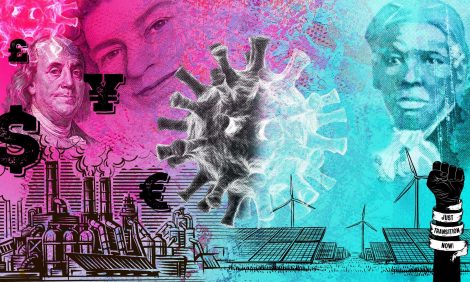“The world is currently facing a series of existential and interlocking crises… But as we know from the long history of inequality that exists in the world, people won’t suffer these crises equally, some are already bearing the brunt much more than others, and it is predominantly those in the Global South who are the ones at the forefront of these crises,” stated Ben Tippet, educator, activist, and researcher at The Transnational Institute. He is the author of the recently published report “Paying for the Pandemic and a Just Transition [1].”
So how are we going to pay for these crises? Or more importantly, who is really going to pay? The report answers this question by bringing together ten progressive proposals that could pay for the costs of the pandemic and finance a just transition to a better world.
“We need to make sure that the richest and most powerful people in society, who are often the most responsible for generating these crises in the first place, are the ones who pay,” stressed Tippet. According to the report, the proposal that would raise the most amount of money is a global wealth tax. It’s justification comes from the fact that we live in a world where global inequality is increasing and extreme: “The top 1% own as much wealth as the bottom 88% of the population, so we have an extreme concentration of wealth in the hands of the richest people in society, and this is at a point where the pandemic is threatening to push half a billion people into poverty,” said the author in an interview with Real World Radio.
Another of the proposals, which combined could raise 9.4 trillion dollars a year, is reclaiming 10% of global military spending. “Currently the globe spends 1.9 trillion dollars a year on global military spending and I think that what the pandemic has shown is that we need a broad understanding of human security,” said Tippet. “We know that a lot of this military expenditure, particularly that which is being conducted by the US military, is leading towards a crisis of displacement of people across the world. There is a recent report that shows that since the beginning of the war on terror, the US military has contributed to displacing roughly around 37 million people in the Middle East,” he added.
The author of the report thus argues in favour of reclaiming 10% of global expenditure on the military and putting it into fighting other crises, such as climate change or extreme poverty. “If you think this is utopian, let me say that some countries are on the path of doing this. South Korea and Thailand have said that they would trim defence budgets or military budgets by around 8% next year, with the money going instead to stimulus packages and disaster relief funds,” he highlighted.
As discussed in the report, record high levels of debt and capital outflows have drained resources from the Global South at exactly the point it needs to invest in health, social care and economic support systems. “In the beginning of the pandemic, we saw that 64 countries currently pay more in debt servicing than on healthcare,” stressed Tippet. To counter this, he proposes a debt jubilee, which “could free up the equivalent of 100 billion dollars a year for the Global South over the next ten years.”
Finally, Tippet highlighted how political will is crucial to achieve change. When speaking of the several crises the world is facing, he said: “These are political problems that we choose not to do anything about and we could do something about them if we showed the same political will that we did in terms of fighting the pandemic. The crisis has exposed the fact that if you have enough political will there is so much that we can achieve,” he said. But governments and private actors are not going to do this themselves, so “we need an international movement that will force people to do that and having these conversations across the world is really important,” he concluded.
